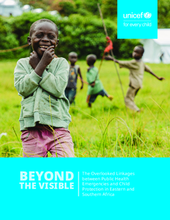Eastern and Southern Africa is experiencing a rising number of public health emergencies, with countries increasingly affected by outbreaks such as polio, cholera, Ebola, Marburg, and mpox. This technical brief explores how such crises disrupt protective environments and heighten risks of violence, exploitation, and neglect for children. Drawing on experiences from Burundi, Rwanda, Zambia, Uganda, and Angola, it showcases innovative and scalable approaches that embed child protection into health-led responses.
Emphasizing that addressing protection concerns is essential to effective outbreak control and recovery, the brief proposes a harmonized framework built around five pillars: community protection systems; support for children and caregivers in isolation; safe discharge and reintegration; protection of children living in vulnerable environments; and care for children without parental support.
Grounded in UNICEF’s Core Commitments for Children and UNICEF’s Operational Response Framework for Public Health Emergencies, it calls for proactive, cross-sectoral preparedness, sustained investment, and institutionalization of child protection in national emergency frameworks to ensure continuity of care and resilience in future health crises.

